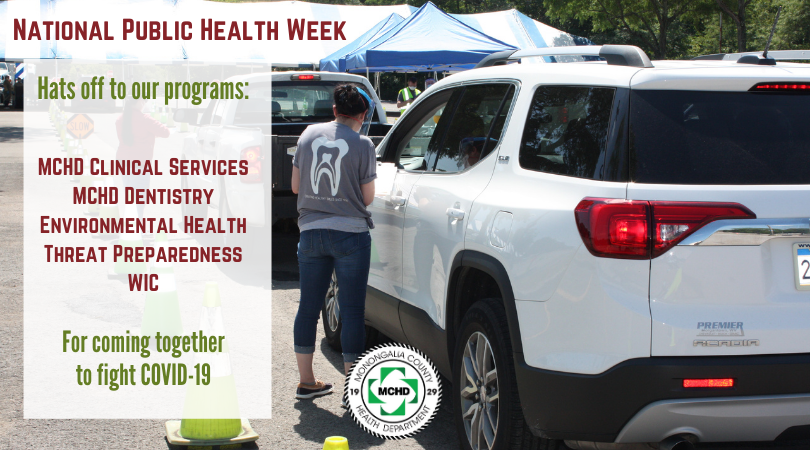MCHD celebrates National Public Health Week by continuing to fight COVID

Apr. 7, 2021
By Mary Wade Burnside
For the second year in a row, Monongalia County Health Department is celebrating National Public Health Week, which started on Monday and runs through Sunday, by combating a worldwide pandemic.
Last year at this time, contact tracing and disease investigation had begun in full force as COVID-19 cases mounted in Monongalia County. Staffers were also busy with tasks such as procuring personal protective equipment (PPE) and distributing it throughout the community, conducting virtual meetings with representatives from just about every establishment in the area, handling a rising number of calls from news outlets, issuing frequent press releases and posting constantly evolving messaging on social media.
A year later, we’re doing that and more, including a return to our pre-pandemic tasks performed by our five programs: MCHD Clinical Services, MCHD Dentistry, MCHD Environmental Health, Threat Preparedness and MCHD WIC. COVID testing ramped up in May and vaccine administration began in December for first responders and health care workers and in January for the general public.
Now anyone 16 and older in West Virginia can make an appointment for an inoculation.
We’ve come a long way in a year, but we still have a way to go. COVID cases are on the rise nationally and in West Virginia. And while the accelerating vaccination rate helps paint an optimistic picture, it’s overshadowed by the fact that more infectious and dangerous COVID variants have emerged.
It’s definitely not the time to be complacent. It’s still important to wear masks, maintain a social distance of 6 feet from others and wash your hands thoroughly.
That was the messaging a year ago and it still stands. But now we have more tools in our arsenal: Anyone can get tested for free and just about anyone can get a vaccine now. Consider getting tested (currently held from 9-11 a.m. Monday and Friday at the WVU Rec Center) if you have symptoms, if you’ve traveled or if you just want to know your status.
And if you haven’t gotten a vaccine, why not? Both the Moderna and Pfizer vaccines are about 90-95% effective in preventing the virus and even more effective in preventing serious illness. It not only helps keep you safe, but also your family, friends and even strangers with whom you interact.
Considering the big picture, like we do during National Public Health Week, look at how the polio vaccine impacted the world. No case of polio has originated in the U.S. since 1979. In the 1950s, people who got the disease sometimes experienced paralysis or had to use a cumbersome and life-limiting iron lung to help them breathe. But the polio vaccine has practically eradicated the disease around the world and dramatically reduced the numbers of cases in the places where it still exists.
That’s just one example of how vaccines have saved lives. There are so many diseases that have been eliminated, such as smallpox, or greatly reduced, such as pertussis and diphtheria, because of vaccines. And as we’ve noticed from current measles outbreaks all over the world, once the number of vaccinations go down, the numbers of illness begin to rise again.
To celebrate National Public Health Week, the American Public Health Association has released messaging of information and goals to improve the infrastructure needed to successfully provide all citizens the care they need. When individuals are healthier, so is the community as a whole.
But to continue the fight, public health needs support. To improve and bolster public health, according to APHA, we must:
• Rebuild. Less than 3% of health spending is on public health. Investing in public health saves lives — 19,000 from the expansion of Medicaid through the Affordable Care Act alone.
• Advancing Racial Equality. For instance, educating health care providers about racial and ethnic disparities can reduce disparities in maternal mortality.
• Strengthening Community. Seniors who feel lonely or isolated are at 26% higher risk for mortality. Rates of preventable deaths typically go down in communities where local public health spending goes up.
• Galvanizing Climate Justice. As temperatures rise, heat waves become more frequent and make heat stroke rates and cardiovascular illness worse. Floods, hurricanes and other weather disaster costs billions of dollars and take a huge toll on mental and physical health. Building strong communities makes them more resilient, so they have better health outcomes after disasters.
• Building COVID-19 Resilience. Investing in public health now will save lives and money when heath threats emerge.
• Uplifting Mental Health and Wellness. Fifty percent of mental illness begins by age 14 and 75% begins by the age of 24. Advocate for mental health support, especially during the COVID-19 pandemic.
• Elevating the Essential and Health Workforce. About 75% of the U.S. workforce still must go to their jobs during the pandemic. Uphold standards that protect workers during the pandemic. Funding a robust public health workforce supports strong programs to protect communities.
You can learn more about National Public Health Week online. If you want to see local health messaging, check out MCHD’s website, and follow us on social media, which includes Facebook, Twitter and Instagram.
Mary Wade Burnside is the public information officer at Monongalia County Health Department.